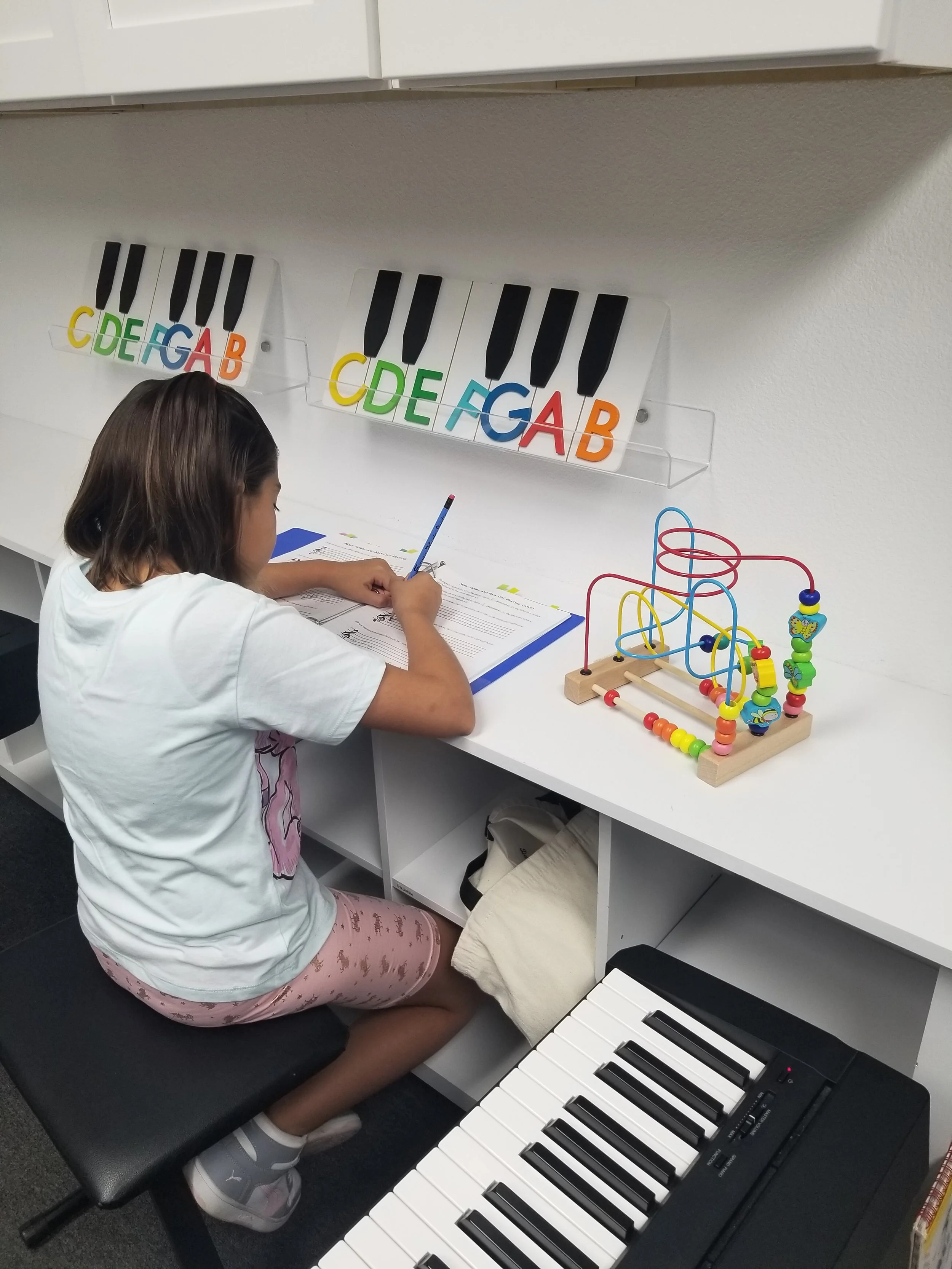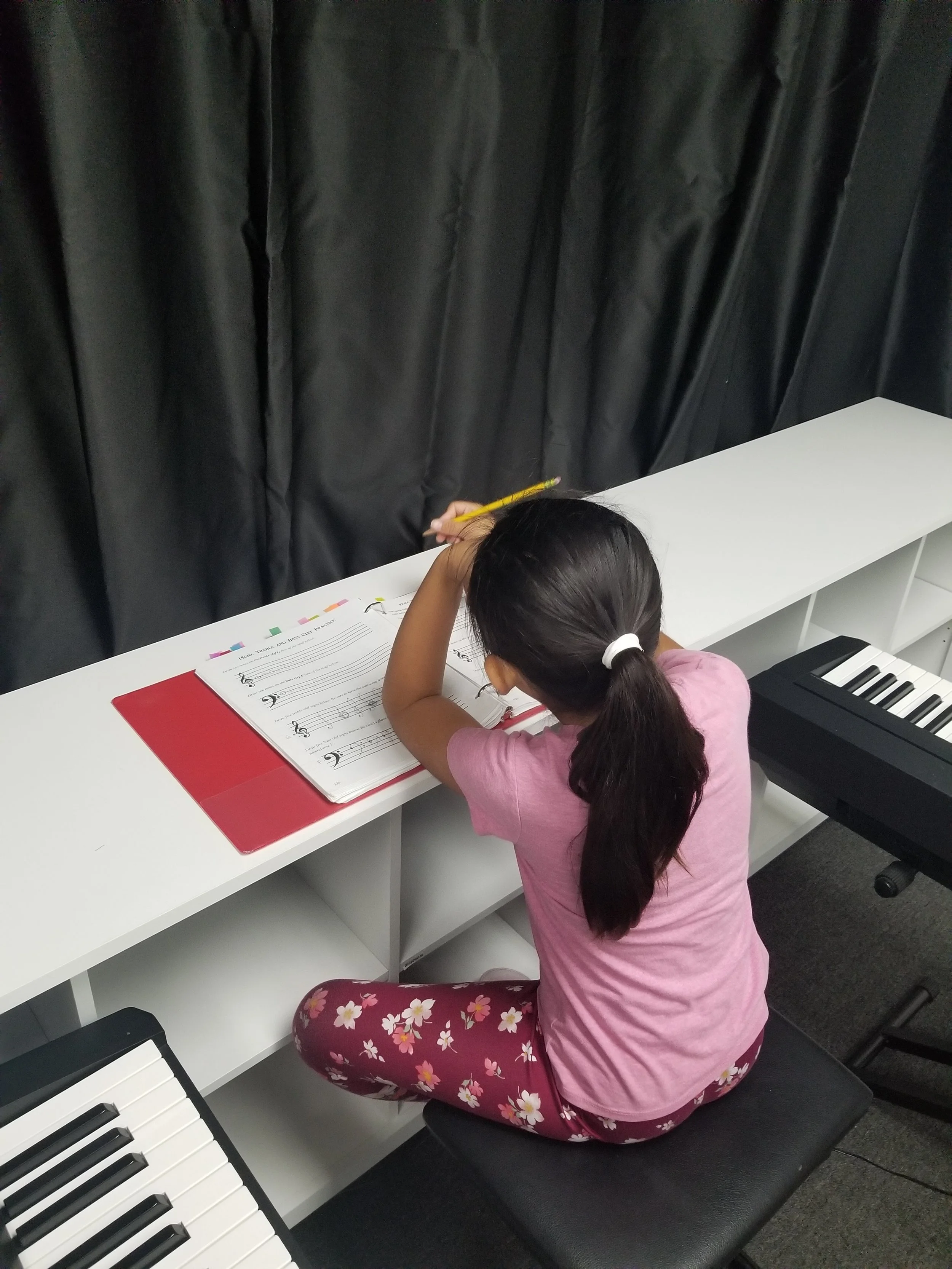
Music Theory, Composition, & Songwriting Lessons
In addition to piano lessons, voice lessons, guitar lessons, instrumental music lessons, and music ensembles, we offer music instruction in music theory, musicianship, composition, and songwriting.
This includes preparation for exams and honors programs, such as AP Music Theory, Certificate of Merit (CM), and RCM, as well as preparation for admissions to high school and college music programs, and for university or music conservatory entrance requirements and auditions.
The study of music theory, composition, and songwriting is essential for musicians…
…because it transforms us from passive players into expressive, creative artists who truly understand the language of music.
These disciplines provide the tools to decode and shape music, giving music students the power to not just perform what others have written, but to create, interpret, and innovate on our own.
“Dr. Dennis is truly passionate about teaching and nurturing music students, and it shows in every lesson. His methods are all about positive reinforcement, which is much healthier than traditional/strict methods. His students enjoy going to lessons, and enjoy playing on their own at home as well! I highly recommend Dr. Dennis and his staff (personally vetted by himself)!”
— Diana C.
"We thought Music Theory would be dry—but the teacher made it fascinating, connecting chord progressions to modern music and games. My daughter ended up loving it so much she double‑majored in it at college! She not only passed the exam but learned to hear music on a whole new level."
— Caroline E.
“This class totally saved me. I went from barely understanding key signatures to scoring a 5 on the AP exam!”
— Kevin J.
Understanding the Language of Music.
Music theory is like grammar for music. It helps students understand why music sounds the way it does — why certain chords move us, how melodies are constructed, and how rhythm creates energy or calm. With theory knowledge, students become better readers, better improvisers, and better listeners. It's the foundation that makes musical learning faster, deeper, and more meaningful.
Creativity with Purpose.
Composition and songwriting allow students to use what they learn to create something uniquely theirs. Whether it's writing a short piano piece, composing a film score, or crafting lyrics that express personal stories, these skills connect music-making with self-expression. They encourage students to experiment, problem-solve, and think like artists — skills that extend far beyond music.
Freedom to Innovate and Collaborate.
Knowing theory and composition opens doors to collaboration and innovation. Musicians can contribute original parts to bands, write music for school projects or videos, and adapt or arrange songs to suit their own voice or ensemble. Instead of copying others, they learn how to contribute ideas, communicate with other musicians, and shape the sound of a group or performance.
Lifelong Musicianship.
A strong foundation in music theory and composition means a student isn't limited to playing only what’s in front of them. They develop the independence to create, interpret, and express music for a lifetime. Whether they go on to be professional musicians, teachers, producers—or simply passionate hobbyists—the skills they build in these areas set them apart and give them lasting joy.
At the Dennis Frayne Music Studios, we encourage all students — not just the advanced ones — to explore theory and composition as a vital part of becoming a complete musician. It’s where understanding meets imagination, and it often becomes the part of their musical journey they love most.
Music Theory Lessons, Classes, & Tutoring
For students seeking music theory lessons for their own purposes, for specific program preparation such as high school AP Music Theory, Music Teacher Association of California (MTAC) Certificate of Merit (CM) exams, and Royal Conservatory of Music (RCM) exams, and for preparation for admissions to high school and college music programs, and for university or music conservatory entrance auditions.
Tutoring and coaching are available, including assistance with college-level music theory coursework.
Music theory lessons include musicianship skills. This means ear training, sight singing, solfege practice, audiation, playing by ear, music transcription, and conducting.
Click here to learn more about our Exams & Honors Add-on Package in our Membership options.
Music Composition & Songwriting
For students seeking lessons in music composition, including voice leading, chord progressions, harmony, inventing motives (motifs), composing melodies, counterpoint, orchestration, arranging, and more. Student can focus on classical music, jazz, blues, film music, and other traditional and non-traditional styles and genres.
For students seeking lessons in songwriting, including writing melodies and lyrics, chord progressions, harmonies, and setting text to music. Students can focus on styles and genres from pop music, to vocal jazz, to classical art song, musical theater and opera, to church music, and choral music.
New students seeking music theory, composition, and songwriting lessons must schedule an introductory music lesson. (Currently enrolled students do not need to schedule an introductory lesson. Instead, talk to your teacher, the Office Manager, or Dr. Dennis.)

“Dennis’ creativity, preparation, and attention to detail positively set the stage for learning to occur. Dennis creates an atmosphere that motivates students to take risks and challenge themselves to advance. Dennis demonstrates the desire to see students succeed through his dedication, self-evaluation, and compassionate nature.”
— Kim R.



